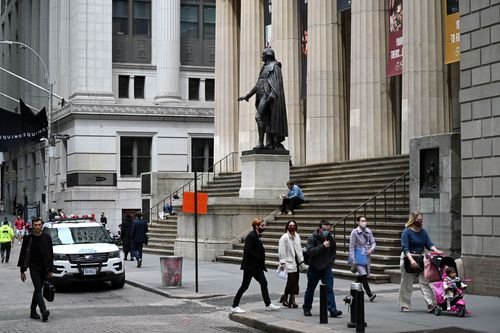US stocks rise despite weak jobs report

Bad economic news was once again greeted with cheers on Wall Street. Investors brushed off Friday’s surprisingly weak jobs report, which showed far fewer jobs were added last month than expected.
The Dow and the S&P 500 both rose to new all-time highs Friday, and the Nasdaq was up nearly 1% as big tech stocks bounced after a recent stretch lagging the broader market.
For the week, the Nasdaq is still down 1.6%. The S&P 500 and Dow have gained 1.2% and 2.6% respectively over the past five days.
The jobs report also showed that the unemployment rate ticked up and wages surged. The jump in worker paychecks may not seem like a bad thing, but it tends to set off alarm bells about inflation. And many economists are worried inflation is due to come roaring back because of all the stimulus from Washington.
Still, investors seemed unfazed Friday.
One possible reason for the rally is that investors may be betting that the Federal Reserve will not pull back on its easy money policies that have propped up financial markets anytime soon — something traders started to worry about after Treasury Secretary and former Fed Chair Janet Yellen recently suggested that rates may soon need to head higher.
“The Fed is going to have to continue to be in a position to help support the economy,” Mace McCain, president and chief investment officer at Frost Investment Advisors.
He added that anything that keeps the Fed on the sidelines with regards to future rate hikes is good for tech stocks, which have benefited from low interest rates.
To that end, Apple, Google owner Alphabet, Netflix and Tesla posted solid gains Friday, as did Microsoft and other top tech stocks.
Two other momentum stock darlings from the world of tech, streaming services leader Roku and Jack Dorsey’s payment giant Square, also soared thanks to strong earnings reports.
But what about inflation concerns? Investors were likely brushing off the uptick in wages because many people in lower-paying jobs in the leisure and hospitality sectors, such as bars and restaurants, have yet to return to full-time work.
That sector did bounce back sharply in April, with 331,000 jobs added. But it remains in a deep hole since Covid-19 forced the economy to essentially shut down last March.
“This report serves as a reminder that while we have come a long way from the depths of pandemic recession, there is still a long road ahead,” said Craig Fehr, an investment strategist with Edward Jones.
Fehr expects wage growth will start to moderate as more workers in lower-paying services sectors return to work.
Other factors at play also might be making the wage data a little noisy.
Thomas Hogan, a senior research fellow at the American Institute for Economic Research, noted that the combination of more people moving from part-time jobs to full-time work as well as labor shortages due in part to generous stimulus checks from the federal government, is artificially boosting worker pay.
That effect should soon pass — and it looks like investors realize that it won’t make the Fed nervous about inflation getting out of control.